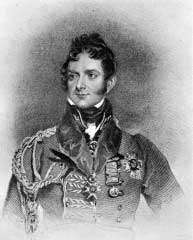Henry Torrens (British Army officer)
| Sir Henry Torrens | |
|---|---|
 Major-General Sir Henry Torrens | |
| Born | 1779 |
| Died | 1828 |
| Allegiance |
|
| Service/branch |
|
| Rank | Major-General |
| Awards | Knight Commander of the Order of the Bath |
Major-General Sir Henry Torrens KCB (1779– 23 August 1828) was an Adjutant-General to the Forces.
Early life
Torrens was born in Derry, Ireland in 1779. He was the youngest son of the Reverend Thomas Torrens and his wife Elizabeth Curry. He lost both his parents at an early age, and was educated at a military academy in Dublin.[1] Robert Torrens, judge of the Court of Common Pleas (Ireland), was his brother and Robert's namesake Colonel Robert Torrens, the economist, was his first cousin. The family was of Swedish origin.
Military career
Torrens was commissioned as an ensign into the 52nd (Oxfordshire) Regiment of Foot in 1793 at the age of 14.[2] In 1796 he served under Abercrombie in the West Indies, where he displayed great bravery, was wounded, and rewarded with a company. He served in Portugal in 1798; in Holland under the Duke of York in 1799; and afterwards in Nova Scotia, Egypt, and India.[1]
In 1799 Torrens went to Den Helder where he was involved in battles at Hoorne and at Egmond aan Zee: at the latter he was wounded by a bullet.[2] In 1805 he was promoted to the rank of lieutenant-colonel. After seeing service at Buenos Aries in 1807, he accompanied Sir Arthur Wellesley as military secretary to Portugal in 1808, and was present at the battles of Roliça and Vimiera.[1]
Torrens rose to be appointed Military Secretary in 1809. He attained the rank of major-general in 1814, and was gazetted K.C.B. and then Adjutant-General to the Forces in 1820[2] and the onerous task of revising the army regulations and introducing many improvements was imposed upon him.
Torrens died while out riding with his wife and daughters at Welwyn, Hertfordshire, 23 August 1828, aged 48.[1][2]
Family
In 1803 he married Sarah Patton at St. Helena, the daughter of the Governor of St. Helena,[1] and together they went on to have four sons and two daughters.[2]
References
| Military offices | ||
|---|---|---|
| Preceded by James Gordon |
Military Secretary 1809–1820 |
Succeeded by Sir Herbert Taylor |
| Preceded by Sir George Beckwith |
Colonel of the 2nd West India Regiment 1818–1822 |
Succeeded by Sir John Byng |
| Preceded by Sir Harry Calvert |
Adjutant General 1820–1828 |
Succeeded by Sir Herbert Taylor |
| Preceded by James Coates |
Colonel of the 2nd (The Queen's Royal) Regiment of Foot 1822–1828 |
Succeeded by Sir James Kempt |